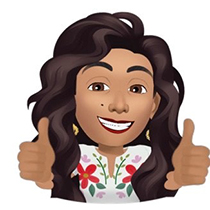 By S Marathe (full name withheld upon author’s request)
By S Marathe (full name withheld upon author’s request)
As a young Rotary member who has lived with a vision impairment, I have come to understand the importance of allies. An ally is anyone that actively aspires to be inclusive and is intentional through their thoughts, actions, and words to consciously promote a respectful and inclusive culture.
Many organizations are actively attempting to address the low employee representation across minority groups of gender, culture, and disability and are adopting a range of strategies. But many times, it’s the day-to-day actions that make the most difference. For International Day of Persons with Disabilities, 3 December, I wanted to share some of the characteristics that make a great ally.
Understand that we are all unique
Allies are deeply empathetic and appreciate that my life experience with a disability is unique to me. No two people with a disability are the same, even if they experience the same type of disability. Their life experiences, preferences, and opinions will be unique. Therefore, you should not take a “cookie cutter” approach and assume what support they need without asking them first. Although you may think you are doing the right thing, support to them may look very different and what you offer may not be helpful at all.
I am legally blind as I have no central vision; however, my peripheral vision is amazing! I don’t use a cane and I’m comfortable with my mobility and navigation – which often catches people by surprise as they think of a blind person with a stereotypically image of someone with a cane or guide dog.
Show genuine curiosity with a desire to learn and understand
Allies are not afraid to ask if they don’t know, educate themselves, and practise what they learn. They take responsibility for their behaviour and, if they don’t get it right the first time, sincerely try again.
Breaking down stigmas and stereotypes is only possible if you have a two-way conversation, are exposed to diverse individuals, and are willing to be open minded and appreciate things from different perspectives. I’ve found that sharing the story of what I can and can’t do helps remove barriers and build trust.
Many people, upon seeing me looking closely at my smartphone, will begin a conversation with “looks like someone needs glasses” or “didn’t your mother tell you not to watch the screen so close.” When I explain that I have no central vision, they are surprised and ashamed and go silent. The response I love to hear is, “that sounds interesting, tell me more.” My disability is a part of who I am and I’m not ashamed of it, nor should you feel ashamed on my behalf.
One in five individuals are living with a disability, so chances are you already know someone. I encourage you to challenge your existing assumptions and seek to understand from them first. Let’s keep the conversation flowing, tackle the deep issues, and change social norms so it is no longer taboo!
Create space for me to use my voice, feel empowered, act, and define my own identity
In my younger years, when I was still in deep denial, I found supportive individuals such as my parents and close friends invaluable, but I didn’t want them to advocate for me. I wanted their help quietly.
As I met other like-minded individuals and felt the power of community at conferences, I developed my own voice and advocated for myself at university.
The allies I found most impactful were the ones that didn’t just clear obstacles for me but taught me how to do so. Their role was to fill me with confidence and listen as I tested my ideas and developed my voice. When I did fall, they were there to unpack it, help me understand what didn’t work, and propose new approaches.
It’s my life and I want to live it! I want to try climbing up a mountain on a tandem bike feeling every bead of sweat dripping down my face. I want to travel solo around the world and taste that first bite of gooey centred jam donut in Poland. I want to feel the sense of accomplishment as I present my project in front of a board of executives. I want to be given the same opportunities and experiences – even though I might perform the tasks differently and reach a different outcome.
An ally is one who is there by my side, pushing me to keep going. I believe allyship comes to most Rotary members naturally – inclusive behaviour is strongly grounded in our values and Code of Conduct, “to be fair in all dealings with others and treat them with the respect due to them as fellow human beings”. If we apply that and The Four-Way Test, Rotary members will be well set up to be good allies.
Learn more about Rotary’s Diversity, Equity, and Inclusion task force.
https://blog.rotary.org/2021/12/03/being-a-good-ally-to-those-with-disabilities/

